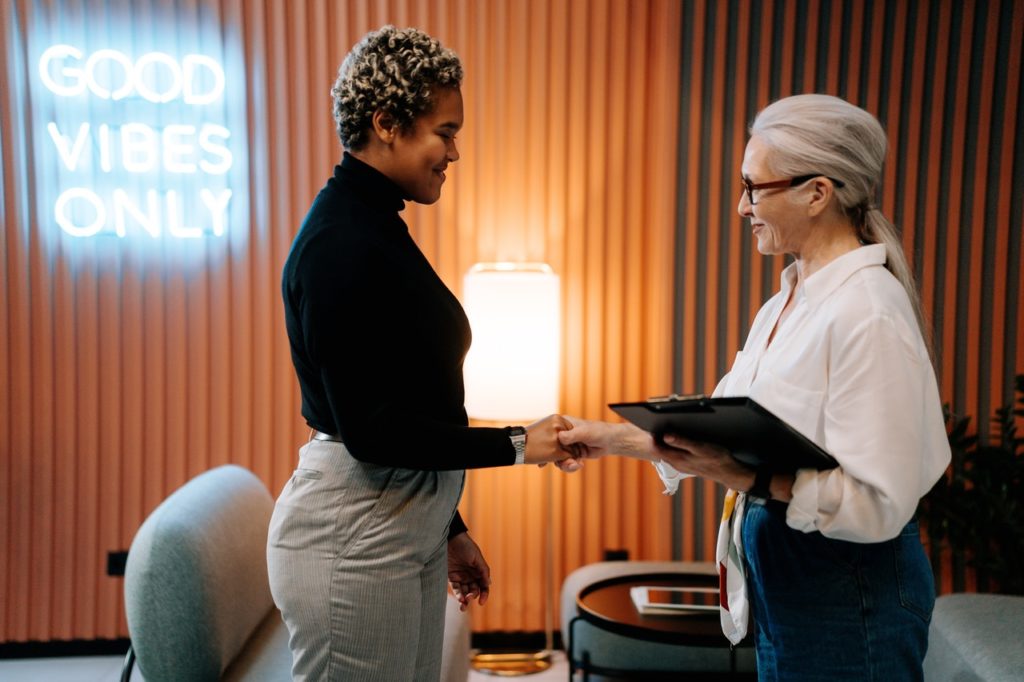Your relational style plays a huge role in how you’re perceived by others.
When you know and understand your relational style, it becomes easier to improve your personal relationships.
When you understand others’ relational styles, you can quickly become a social virtuoso.
So, let’s explore the main factors that affect relational styles.

Why Do People Have Different Relational Styles?
The ways we try to relate to people can change in an instant, depending on the people we’re communicating with, the particular scenario and what we want from the interaction.
Nevertheless, people do tend to have a default relational style.
In this guide, we’ll explore three major factors which affect this; attachment style, relational focus and communication style.
These three factors are mostly shaped by your experiences communicating with other people. As such, they can change over time.
Nevertheless, they tend to be based on your personality and are therefore difficult to change overnight.
Still, by understanding our relational style, the factors that affect it and the styles that others might be adopting, it can become easier to connect with people.
Emotional intelligence can lead to better opportunities at work, better social experiences, a better love life. The benefits are endless, so it’s worth putting in the work to build it.
What Are The 3 Attachment Styles?
The three attachment styles were determined by British psychologist John Bowlby in the 1950s.
These are descriptions of the three ways that people try to relate to romantic partners.
They are:
- Secure. They find it easy getting close to others, expressing their needs, depending on their lover and being depended on. They don’t fear abandonment. They don’t let negative thoughts control their relationships. As a result, their love life is relatively easy. They certainly don’t cause problems for themselves.
- Anxious/Preoccupied. They have a strong desire for commitment. They often chase it too quickly and aggressively, trying to control a relationship, which can scare potential partners away. This desire tends to stem from a fear of abandonment. They need another human to love them to feel complete.
- Dismissive/Avoidant. They find it uncomfortable being close to others. They can’t trust them or depend on them. They rarely reveal emotion and usually avoid attachment by spending time alone. Their lovers often want them to be more intimate than they are comfortable with.
Clearly, a secure attachment style is the most healthy. Yet, only an estimated 60% of people adopt this style. The other 40% are most likely emotionally traumatised from their past experiences.
Those with dismissive and anxious attachment styles tend to attract each other. This typically leads to relationships charactierised by friction, conflict and confusion.
The best thing that these people can do is to recognise and understand their attachment styles (there are plenty of online quizzes for this) and how it could potentially damage a relationship.
A dismissive lover would be well advised to recognise when they are prone to emotionally checking out. Perhaps they do this by choosing partners with no interest in long-term intimacy, or by sagotaging relationships with those who really like them.
An anxious lover needs to understand that they’re not bad for seeking intimacy, but also that aggressively seeking a partnership can be off-putting, especially for dismissive lovers. They’d be well-advised to learn how to be comfortable by themselves, before trying to seek a partner.
Dismissive and anxious lovers can make it work, but they will need to understand this aspect of themselves and the person they’re dating.
What Is Relational Focus?
This idea is used to describe where people focus their attention in any personal relationship.
There is:
- Self-focus. Focusing on your own needs and desires.
- Other focus. Focusing on your partner’s needs and desires.
- Activity focus. Focusing on the task at hand, without too much thought regarding what either of you wants or needs.
Among psychologists who have studied this topic, it’s generally accepted that a flexible balance between self-focus and other focus is optimal for a healthy relationship. However, it’s also agreed that many lovers struggle to be flexible in this sense.
Those who do not trust others to care for their emotional needs may over-engage in self-focus, often at the expense of the relationship, as the other individual will end up feeling neglected.
A chronic focus on the other person is also uncommon among anxious lovers who fear abandonment, sometimes even at the expense of their most basic emotional needs. Whatever it takes for that other person to stay.
Dismissive lovers usually deal with their fear of emotional connection by engaging in activity focus. This could take the form of an obsession with individual pursuits, or an unhealthy obsession with one aspect of the relationship, like making love.
As with attachment styles, understanding your relational focus is a key first step to tweaking it into a more healthy flexible direction.
Masculine Vs Feminine Communication Styles
There have been plenty of comedy skits based on the differences between male and female communication styles. But that’s because there’s so much truth behind it!
Women tend to chat to foster relationships and build stronger connections. Most could happily sit around the coffee table gossiping about the same topic for hours.
Men are happy to save their words for the exchange of information. Most could enjoy a whole day of playing and watching sports with their buddies without finding anything new about them. Most likely, the conversation will remain focused on the activity they are doing or the solution to whatever goal they are trying to achieve.
As with the previous topics, this is mostly due to socialisation, although it could be argued that masculine and feminine hormones play a role. (A surplus of estrogen makes you a more emotional person, for example).
There are some men with a feminine communication style and women with a masculine communication style (and that’s fine).
Problems arise when two people in a relationship don’t understand the differences in their styles.
A classic example: Mrs May comes home upset because of a disagreement she had at work. She starts to tell her husband about these issues, and Mr May quickly begins to come up with solutions. But this hurts his wife’s feelings even more. She doesn’t need solutions yet, she just wants to talk about it.
When Mr May quickly offers a solution, she doesn’t feel heard. She doesn’t think he cares. Remember, women chat in order to build stronger connections. Mr May doesn’t see this. He thinks she wants a solution. That’s what his male buddies would like to find.
How Can I Be More Relational?
If you struggle to build strong relationships with other people, this list of tips will help you do that, regardless of your attachment or communication styles.
- Don’t fear being social. We are all relational creatures. Most people will appreciate and respect when you’re the one to ‘break the ice’ in a social setting, provided you do it in a friendly and understanding way.
- Smile and eye contact. Smiling is the universal sign of friendliness. Strong but relaxed eye contact helps to build trust.
- Remember and use people’s names. As Dale Carnegie says in the world-famous self help book ‘How To Win Friends And Influence People’: “A person’s name is the “sweetest and most important sound in any language:” Use it often.
- Be genuinely interested in others. When you let people talk about themselves and take the time to show genuine interest, they’re more likely to open up to you. Listening is the best skill to learn if you’d like to get on well with others.
- Become vulnerable. Take the lead and be the first to admit an imperfection. They’ll feel more free to do the same.
- Give compliments. It’s one of the easiest ways to make people like you. Make sure they’re genuine though.
- Say “thank you”. Showing gratitude is a simple way to build rapport with another person. You can’t do this enough times.
- Speak with emotion. Many people tend to bottle their true emotions, especially around a new person. You’ll build stronger relationships if you open up.
- Be genuine. People can sense when you’re putting on a fake persona. They’ll be less likely to open when you do.
- Share credit and take blame. This is what great leaders do after a big win or a big loss at work, but it will help people look up to you anywhere.
- Seek to understand before being understood. If you’re upset with someone’s action, try to understand why they did it before you emotionally unleash on them. This is a great way to calm conflict.
- Avoid unnecessary conflict. Don’t point out when people are wrong, during frivolous conversations. It does nothing useful and can harm your relationship.
- Don’t see yourself as better than anyone else. Don’t order people around. Don’t put yourself below someone either. We’re all human. One big family. This is a useful way to think about others around you.

Any More Questions About Relational Styles And How They Affect Personal Relationships?
I hope you could use this new article to get a clearer understanding of your relational style and how it affects your personal relationships.
If you would like to ask a question on this topic, feel free to leave one in the comments section.
I would love to know your thoughts and feelings about this topic and will do my best to help.
Related Posts
It Takes Courage To Show Your True Self – 10 Huge Benefits
Best 15-Day Confidence Challenge With Lasting Results
7 Ways To Use The Power Of Powerless Communication
